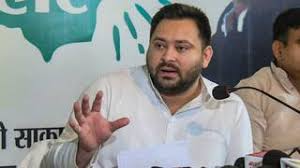‘Bihar will throw Act in dustbin’: Tejashwi, Pappu Yadav join thousands at protest against Waqf Amendment

On June 29, 2025, Patna’s Gandhi Maidan turned into a loud symbol of dissent. Thousands gathered to oppose the recently passed Waqf (Amendment) Act 2025. The protest, organized by Imarat-e-Shariah, aimed to protect both waqf properties and constitutional values.
The crowd shouted slogans like “Waqf Bachao, Samvidhan Bachao”—Save Waqf, Save Constitution. Protesters came from all parts of Bihar and beyond. Many carried placards and banners rejecting the new law and demanding its repeal.
Tejashwi Slams the Government
Tejashwi Yadav, RJD leader and former Deputy CM of Bihar, addressed the crowd with strong words. He accused the central government of trying to destroy the rights of minorities, Dalits, and backward communities.
“This law will not stand. If we win in November, we will throw it into the dustbin,” Tejashwi thundered.
He also warned about changes to the voter list. According to him, a new Election Commission (EC) notification might remove poor voters who lack proper documents.
Pappu Yadav Joins the Chorus
Independent MP Pappu Yadav also took the stage. He claimed that the EC’s guidelines would erase 4.7 crore voters from the rolls. These include the poor, landless, and those living in slums.
“The government wants to steal their votes in silence. We will not let that happen,” he said.
Pappu called the protest a fight for democracy. He urged people to remain alert and united.
What the Waqf Amendment Changes
The Waqf (Amendment) Act 2025 gives the Waqf Board more power. It allows them to declare any property as “waqf” without informing the owner first. This move has triggered public outrage.
Legal experts say the law violates the Constitution. It affects Article 14 (Equality), Article 25 (Religious Freedom), and Article 300A (Right to Property). Many argue it also goes against several Supreme Court rulings.
Legal and Political Voices Join In
The protest saw a wide coalition of leaders. Apart from Tejashwi and Pappu, the stage featured:
- Imran Pratapgarhi (Congress MP)
- Dipankar Bhattacharya (CPI-ML)
- Akhtarul Iman (AIMIM)
- Senior scholars and clerics from Bihar and neighboring states
Congress leader Salman Khurshid sent a video message. He called the law “unconstitutional and dangerous.”
“No board can take away private land without due process. This is not justice,” he said.
A Peaceful but Powerful Gathering
Despite the large crowd, the protest remained peaceful. Volunteers managed the event with discipline. Police stayed on standby but did not need to intervene.
Organizers asked everyone to maintain calm. Their goal, they said, was not disruption but justice.
Many called the event the largest protest against the Waqf Act in India so far. It also marked one of the biggest opposition gatherings in Bihar this year.
Eyes on the Elections
With the Bihar Assembly elections approaching, the rally had political undertones. Tejashwi and Pappu used the stage to build momentum. They urged the crowd to support the Mahagathbandhan (Grand Alliance) in the polls.
Tejashwi said the protest was only the beginning. He promised to revoke the Act if his alliance forms the next government.
“We need to save Bihar, save the Constitution, and save every poor person’s vote,” he declared.
Pappu Yadav echoed this message. He said the upcoming election would decide the state’s future.
What’s at Stake?
Activists believe the new Waqf law threatens more than land rights. It sets a precedent for removing protections guaranteed under India’s Constitution. At the same time, changes to the voter roll raise concerns about fair elections.
These two issues—land ownership and voter rights—could become defining themes in the 2025 Bihar polls.
The opposition hopes to use public anger to shift the tide. Meanwhile, the ruling government has yet to respond in detail.
Conclusion: More Than a Protest
June 29 wasn’t just another day of political speeches. It marked a turning point in Bihar’s growing unrest over land and democracy.
The Gandhi Maidan protest gave voice to deep frustrations. It brought together different political groups under a single cause—protecting the rights of the marginalized.
As Bihar moves toward elections, this rally may well be remembered as the day the opposition found its rhythm—and the people found their voice.






